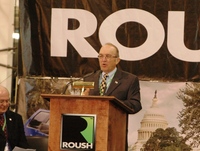Jack Roush Puts Propane in Ford Trucks - VIDEO ENHANCED
MORE: 2008 Propane Engine Fuel Summit Coverage
By Steve Purdy
TheAutoChannel.com
Detroit Bureau
Timing is everything, they say. Who are “they,” you ask? Well, who cares? But we can say Jack Roush’s timing is pretty good. Not only did he (Roush Fenway Racing) finally win the Daytona 500 after years of campaigning, but a few days later he announced the coming to market of a project he and his team have been diligently working on for the past three years that could change the face of the fleet truck business.
Timely, indeed. We’ve never been as interested in reducing dependence on foreign oil, reducing the carbon footprint of all our endeavors and minimizing costs of doing business while producing “green-collar” jobs for some of Michigan’s many unemployed workers. Roush, the famous performance engineering company of Livonia, Michigan, with funding from the Propane Education & Research Council (PERC) of Washington D.C., has developed an efficient, practical application for propane powered light trucks and they are aggressively pursuing fleet owners to use the technology.
We’ve had propane-powered vehicles, particularly small delivery trucks, lift trucks and other commercial vehicles in very limited fleet use for years. But this is the first viable project designed for mass application on light and medium-duty on-the-road trucks.
The current conversion fits only the 2007½ and 2008 Ford F-150s, but development will be complete in the next few months (by summer ’09) for the F-250 pickup and within a year for the E-250 utility van. Next comes conversions for the 2009 F-150. Range is in the neighborhood of 450 miles with the dual-walled, steel bed-mounted tank that takes up just a few cubic feet of cargo space. A smaller, under-body tank is available as well.
The Roush conversion essentially replaces the entire fuel system, including fuel tank, fuel lines, fuel pump, injectors and most importantly, the electronic controls that manage the whole system. Included in the development job, of course, are EPA and CARB certifications, which are complete for the current applications.
Why propane, you ask? Well, there are many reasons, they insist.
The use of propane cuts into our importation of foreign oil. Fully 90% of the propane used in the US is produced domestically. And, there is plenty of it. Even if use increases rapidly the market could keep up, insist the experts.
Burning propane reduces greenhouse gasses. Propane has no particulate carbon (like diesel), emits 18% less greenhouse gasses than gasoline or diesel, and produces up to 70% less smog-causing hydrocarbons. It burn so clean, in fact, that the engine stays much cleaner inside as well, reducing the need for oil changes and engine rebuilds.
Historically, propane costs less than gasoline. When gas is at historical highs, as they were last year, propane costs go up less steeply, still costing considerably less.
Click PLAY to watch the Roush Presentation at the recent Propane Engine Fuel Conference
Infrastructure already exists for refueling. You can fill the propane tank at the same places you fill the tank for your gas grill, and it takes about the same amount of time as filling a gasoline tank. And, the cost of building fueling stations is less than it would be for high-pressure compressed natural gas, or even a new gasoline/diesel station. There are already more than 2,500 public propane fueling stations around the country.
While propane is stored under just enough pressure to make it a liquid it is still safer than gasoline, both in terms of volatility and of spillage. Even if the tank is punctured the fuel will not easily ignite, as will gasoline. Propane must be heated to over 900-degrees to ignite – much more than a random spark would cause. If it is spilled and vaporizes it is heavier than air and will soak into the soil dissipating without any toxic effect. Gasoline, of course, will burn violently with the slightest spark and contaminate everything in its path.
Costs of the conversion are significant but not prohibitive and will make sense for some businesses. The whole system adds a bit over $8,000 to the cost of a truck, whether it is installed new or retrofitted. About half of that is covered by a Federal tax credit – not a deduction, but a credit. There also may be state or local alternative fuel tax breaks that are applicable. Fleet owners also get a $.50/gallon rebate on fuel purchases, but pay $.18/gallon in excise tax when propane is used to power a vehicle. The payoff period can range from 18 months to 5 or 6 years depending on fleet mileage and other variables. You’d have to run your own numbers to know.
I spent some time with Don Ferrario, Northeast Region distributor for the Roush propane system, who can hardly contain his enthusiasm for its commercial potential. He’s based in Elmira, NY, has in-depth knowledge of the whole propane system. Ferrario hosts a Web site with all the details at drivepropane.com. “In most cases,” Ferrario told me, “tax credits will amount to about half the cost of conversion.” In spite of having three retail car dealerships he’s spending most of his time pursuing fleet owners in his region selling the Roush system.
Horsepower, torque and towing capacity are just about the same as gasoline-powered versions of the same vehicle. So, what’s not to like?
Right now it is both impractical and illegal to convert your family car to propane power, but it may become an alternative in the future.
© Steve Purdy, Shunpiker Productions, All Rights Reserved



